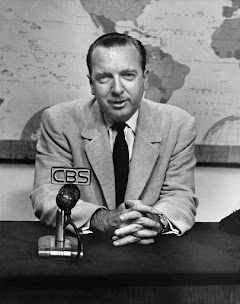Walter Leland Cronkite Jr., more commonly known to the public as Walter Cronkite, was one of the bravest, most determined, and most legendary American journalists of all time. He made it a priority to deliver the truth to America, rising to fame as a war reporter and later, a CBS anchorman. His dedication to the field of journalism earned him an Emmy called the Governors Award and a new award in journalism was named in his honor. He was even famously dubbed, "the most trusted man in America" by a political poll created by Oliver Quayle in 1972. Walter Cronkite was truly the people's journalist.
Walter Cronkite was born on November 4, 1916, in St. Joseph, Missouri. He loved to read books, magazines, and newspapers as a kid, and it comes as no surprise that he worked on school newspapers throughout middle school and high school. Cronkite studied political science at the University of Texas Austin from 1933 to 1935 and worked as a correspondent for a Houston newspaper to help pay for his tuition. In 1935, Cronkite left the university to start working for the newspaper full-time. In 1939, he became a news editor for the United Press International (UPI).
When the U.S. entered World War II in 1941, the United Press promoted Walter Cronkite to overseas war correspondent. Cronkite covered fighting in the North Atlantic, and the invasion of North Africa. In 1944, Cronkite reported on the Allied landing on the beaches of Normandy, France, on D-Day. He was later reassigned to London to report on German bombing raids. He also flew in bombing raids over Germany. After the war ended, Cronkite remained in Europe to cover the Nürnberg trials, and he made his return to America after serving as the United Press bureau chief in Moscow from 1946 to 1948.
Cronkite’s work with the United Press was recognized by Edward Murrow, the vice president of CBS (Columbia Broadcasting System). Murrow originally tried to recruit Cronkite for radio, but Cronkite declined the offer. Some time passed, and Murrow then tried to recruit Cronkite for television, which Cronkite accepted. Little did he know that this would be the start of a blossoming career and decades of television fame. In 1950, Edward Murrow hired Walter Cronkite as a correspondent for the CBS television affiliate in Washington, D.C. Throughout the 1950s, Cronkite went on to host multiple television programs at CBS, including You Are There, an imaginary broadcast about history, The Morning Show, which he co-hosted with a puppet named Charlemagne, and The Twentieth Century, a documentary series.
In 1962 Cronkite attained the position that would skyrocket him into fame. He became the anchorman of the CBS Evening News. Not long after Cronkite took over for the previous anchor Douglas Edwards, the then 15-minute broadcast was extended to 30 minutes, which made it the first half-hour nightly news show on American network television. Cronkite not only broadcasted history, but he also made history himself.
Cronkite started You Are There, a television program that “reported” on important historical events as if they were happening currently, such as the death of Julius Caesar. Those working alongside Cronkite on the program would also "interview" historical figures, such as Sigmund Freud. Cronkite always ended each episode of You Are There with this quote:
“What kind of a day was it? A day like all days, filled with those events that alter and illuminate our times. And you were there.”
The Walter Cronkite Award for excellence in television political journalism is an award given to those who best represent the true purpose of journalism: “combating disinformation and defending democracy”.
Cronkite’s sign-off line as an anchorman at CBS was, “And that’s the way it is.” This line was well-received by viewers and made him appear relatable and quite likable. Unfortunately, Walter Cronkite passed away in his New York City home at the age of 92 on July 17, 2009, of cerebrovascular disease. However, despite his passing, he will forever be remembered as a legendary journalist, and his legacy will continue to live on through his phenomenal work at CBS, and his 1991 memoir, titled, “Walter Cronkite: A Reporter’s Life”. Walter Cronkite was journalism personified, and that’s the way it is.
Sources










No comments:
Post a Comment